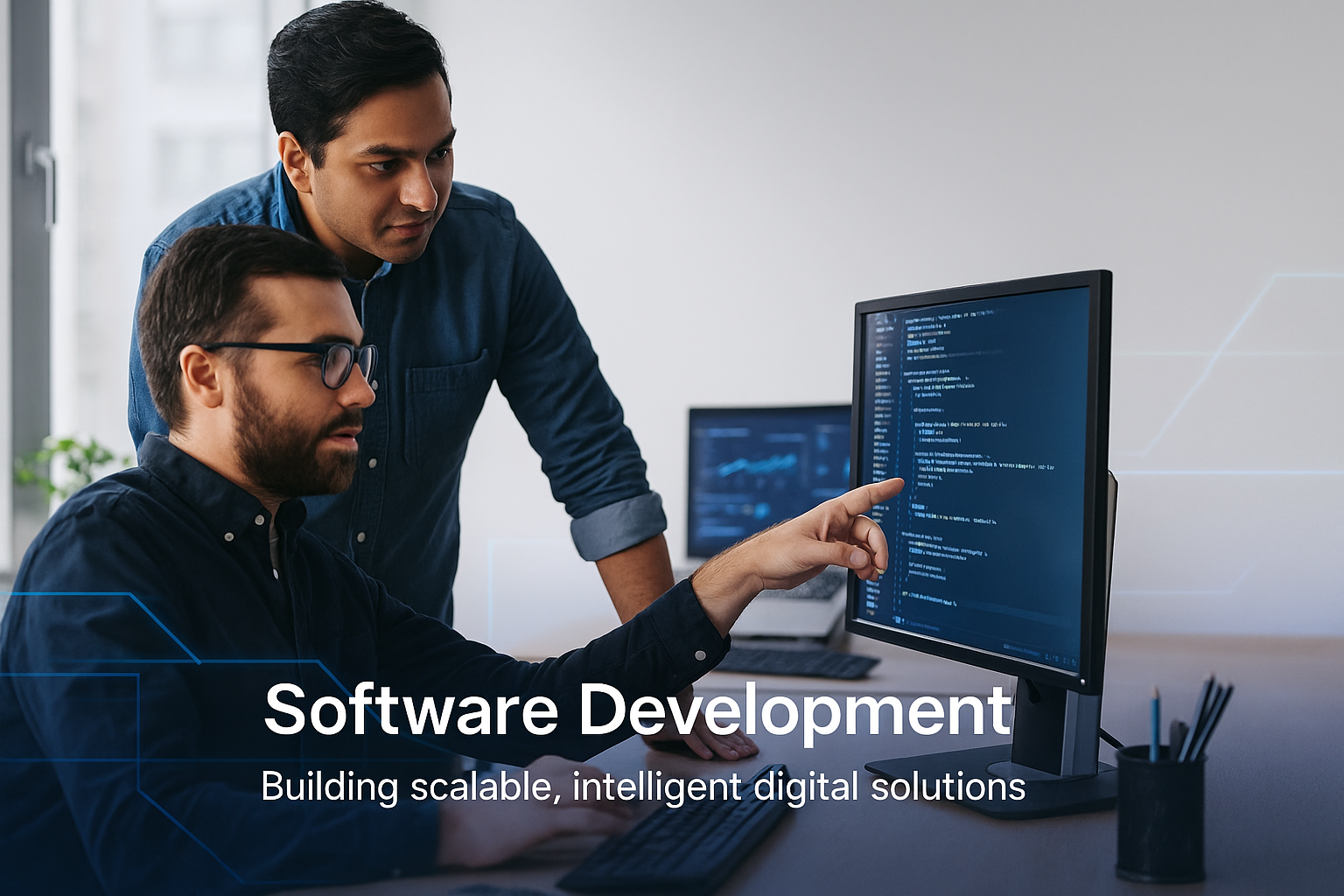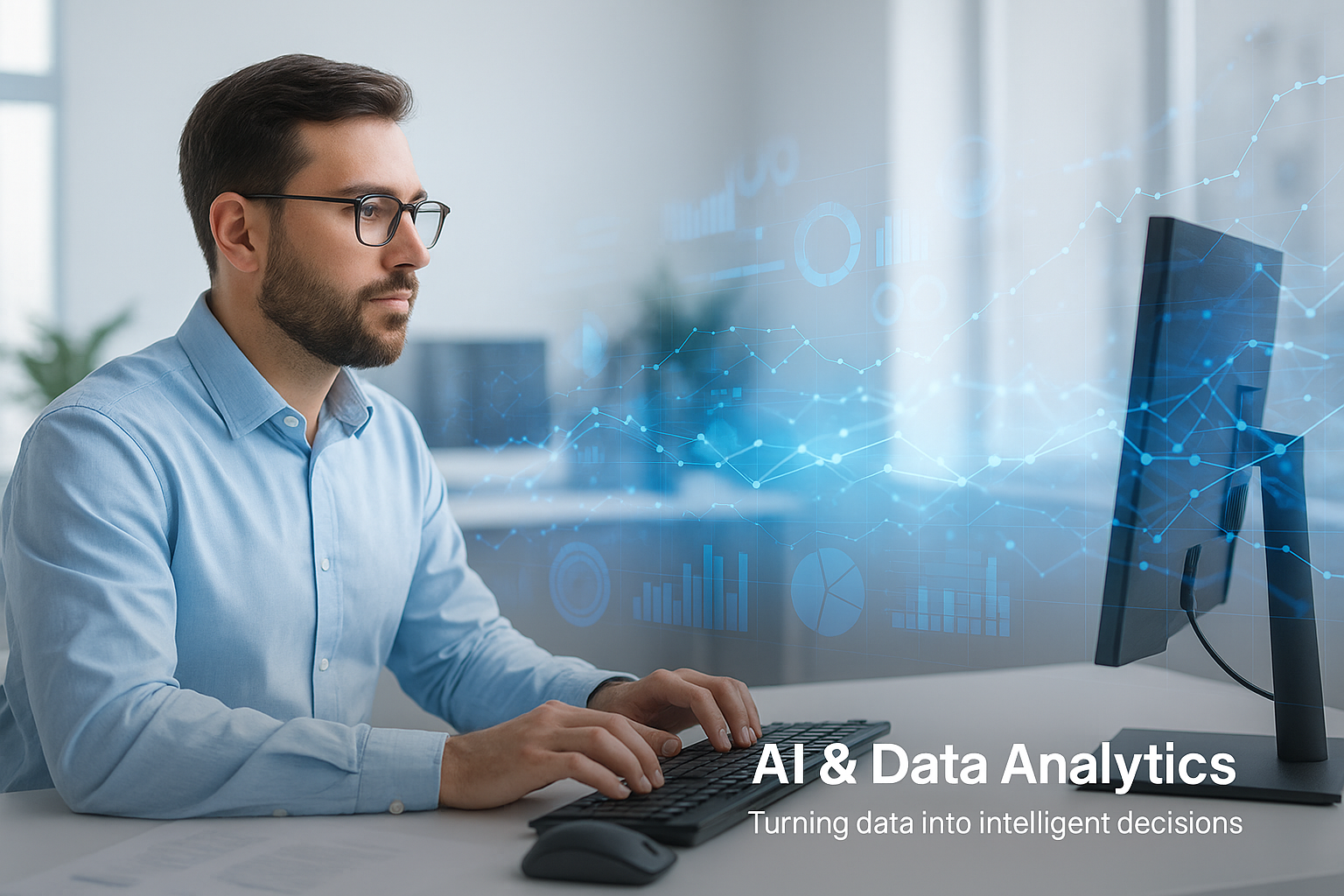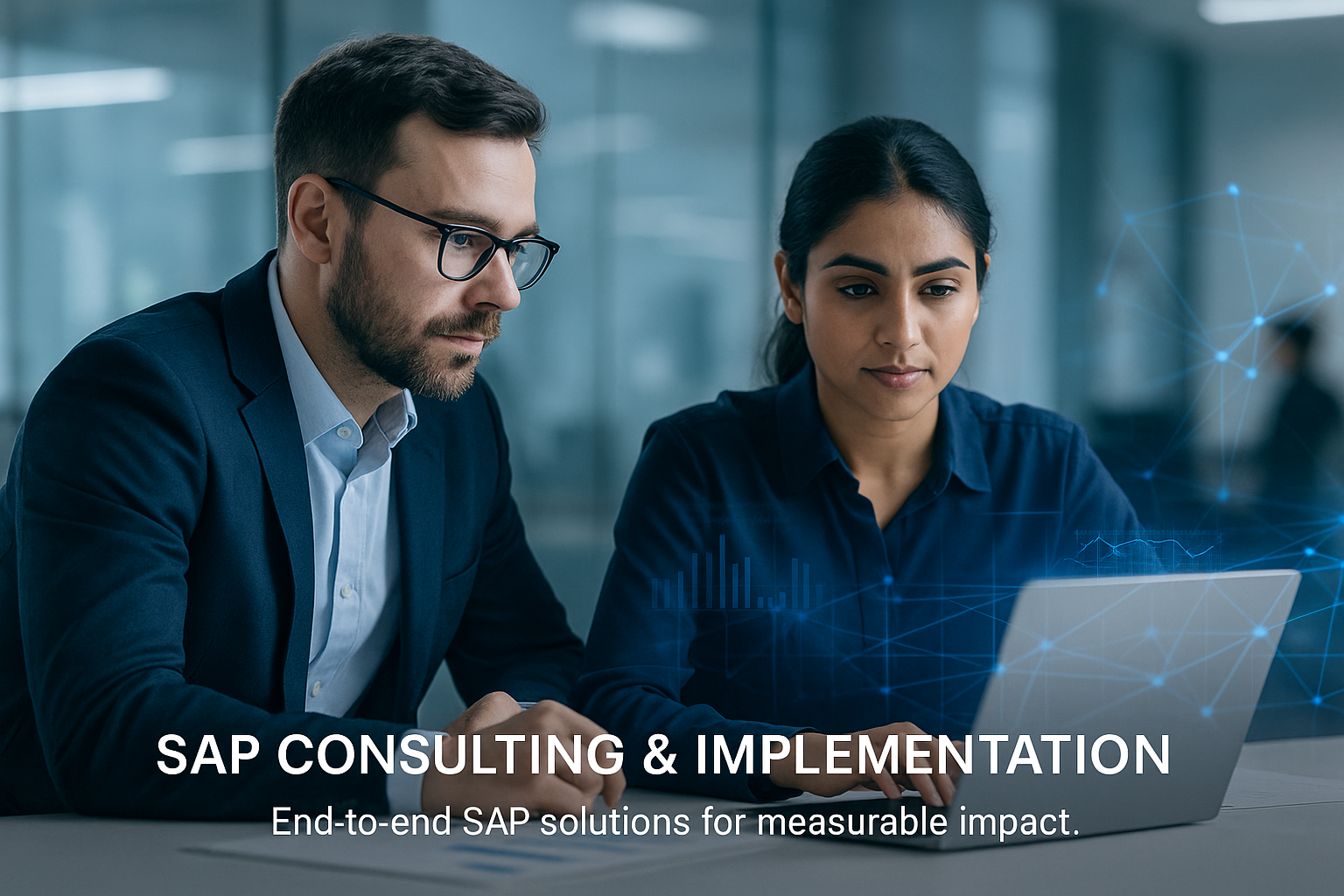Transforming Enterprises with Intelligence and Innovation
Harnessing the power of AI & Data Analytics, Software Development, SAP, and Custom Solutions to build resilient, connected, and future-ready organizations.
Our focus is simple: turn data into foresight, technology into impact, and businesses into intelligent enterprises prepared to lead in a digital-first world.
Our Services
Software Development
We engineer software tailored to your unique ecosystem. Integrating innovation, performance, and scalability for long-term business advantage.
AI & Analytics
Turn raw data into actionable insights, empower decisions with AI, and build autonomous systems that accelerate growth.
SAP Services
From consulting to migration and managed services, we enable seamless SAP transformations that future-proof your business.
Team Augmentation
Scale your development capacity with top engineers who integrate seamlessly.
Direct Hire
Find permanent team members who are invested in your mission.
Tech Advisory
Get expert advice on architecture, stack selection, and best practices.
Why us
Software development is the foundation of digital transformation, enabling organizations to create applications, platforms, and tools that bring innovation to life. It goes beyond writing code to encompass design, architecture, testing, and deployment. At its core, software development translates business needs into reliable, scalable, and secure solutions that drive efficiency and connect people, processes, and technology.
Modern development embraces agile practices, continuous integration, and cloud-native approaches. These methods shorten delivery cycles, enhance adaptability, and ensure that applications evolve alongside organizational needs. The journey begins with an idea or challenge and unfolds through iterative development into systems that support growth and competitiveness.
In today’s digital-first economy, every enterprise is, in essence, a technology company. Software drives customer engagement, powers operations, and enables new revenue streams. Without robust, adaptable applications, organizations risk inefficiency, slow response to change, and declining relevance.
Effective software development provides speed, scalability, and innovation. It enables businesses to digitize processes, unlock productivity, and deliver seamless experiences to users. As industries evolve and customer expectations rise, software becomes the mechanism through which enterprises remain agile and competitive.
The development lifecycle typically begins with gathering requirements and designing systems that align with organizational goals. Agile and DevOps methodologies support flexibility, while cloud-native architecture and microservices ensure scalability. Continuous integration and testing safeguard reliability and performance.
Deployment and monitoring bring systems into production, where they are refined through user feedback and iterative updates. Over time, this cycle ensures that applications are not static products but living solutions that evolve with the enterprise and its environment.
Within this lifecycle, custom software development allows organizations to build solutions tailored to their unique processes and goals, while mobile app development extends functionality to users on the go, enhancing accessibility and engagement.
The need for modern software development often becomes clear when legacy systems slow down operations, when customer-facing platforms no longer meet expectations, or when scaling requires technology that existing tools cannot support. Organizations also recognize the need when competitors leverage digital platforms to gain advantage or when innovation demands cannot be met with off-the-shelf solutions.
At these inflection points, investing in software development — including enterprise platforms, custom solutions, and mobile applications — becomes essential for sustaining growth and meeting rising demands for speed, personalization, and reliability.
Software development impacts industries in diverse ways. Retailers build omnichannel platforms that integrate e-commerce and physical stores. Financial institutions develop secure, real-time transaction systems and mobile banking apps. Healthcare providers design patient management systems, telemedicine platforms, and mobile health applications. Manufacturers rely on software to optimize production, monitor quality, and automate supply chains.
Across sectors, organizations rely on enterprise-grade platforms, custom-built applications, and mobile solutions to solve unique challenges, enabling them to innovate and deliver consistent value to customers and stakeholders alike.
The journey of software development continues to evolve as technologies advance and expectations grow. Trends such as cloud-native architecture, low-code platforms, and AI-assisted programming are shaping the future of applications, making them faster to build, easier to maintain, and smarter in functionality.
Modern software development spans enterprise applications, tailored custom solutions, and mobile platforms that extend reach and usability. By embracing innovative practices and flexible architectures, enterprises not only address today’s challenges but also position themselves to thrive in tomorrow’s digital economy, where software is central to growth, differentiation, and sustained leadership.
Enterprises today are immersed in data from countless sources, including transactions, devices, supply chains, and customer interactions. On its own this information is fragmented and overwhelming, but when paired with Artificial Intelligence and Data Analytics it becomes a powerful driver of insight and innovation. Data Analytics helps uncover patterns, explain causes, and predict outcomes, while AI builds on these insights by learning continuously, adapting decisions, and interacting naturally with users.
Together, AI and Analytics create a cycle of discovery and action that allows organizations to evolve from reactive operations to proactive, intelligent growth. This combination transforms data from a passive resource into a strategic asset, powering agility, resilience, and competitiveness in a digital-first economy.
In the digital economy, businesses face unprecedented challenges: rising data volumes, heightened customer expectations, and rapid market shifts. Without intelligence, organizations remain reactive and risk falling behind competitors who are already using advanced technologies to their advantage. AI and Data Analytics provide a way forward by turning complexity into clarity.
These capabilities strengthen decision-making, automate repetitive work, and personalize customer interactions. They help organizations respond faster to change, build resilience against disruption, and open new avenues for innovation. The value lies not only in efficiency but also in shaping future-ready enterprises that can anticipate rather than simply react.
The journey begins with data collection and integration, combining information from multiple sources such as ERP systems, IoT devices, and customer interactions. This is followed by preparation and enrichment, where data is cleaned, standardized, and transformed into a usable foundation.
Analytics techniques are then applied to generate insights: descriptive analytics explains what has happened, diagnostic analytics explores why, predictive analytics forecasts outcomes, and prescriptive analytics recommends actions. AI technologies such as machine learning and natural language processing bring these insights to life by automating decisions, delivering personalization, and enabling adaptive systems.
Crucially, these systems improve over time. Continuous learning ensures that every new data point refines the models, creating a dynamic ecosystem that evolves alongside the business.
The right time to adopt AI and Analytics varies by organization, but clear indicators often emerge. Growing data volumes that outpace current tools, slow manual reporting cycles, and rising demand for personalization are common signs. Competitive pressure also plays a role, as businesses that leverage intelligence often gain a measurable advantage.
Adoption also follows different paths depending on maturity. Emerging companies may begin with analytics to validate strategies, scaling firms may turn to AI for operational efficiency, and large enterprises may embed intelligence throughout to sustain leadership. Regardless of stage, the shift marks a transformation from reactive to proactive operations.
AI and Data Analytics are not limited to one sector; they are reshaping industries across the economy. Retailers use them for demand forecasting, personalized shopping, and inventory optimization. Financial institutions rely on predictive models for fraud detection, risk assessment, and compliance. Healthcare providers apply them to improve diagnostics, personalize treatment, and manage population health.
Manufacturing companies adopt predictive maintenance and process optimization to reduce downtime and improve quality. Utilities and smart cities use these technologies to monitor infrastructure, manage energy distribution, and drive sustainability initiatives. From operations to customer experience, the impact of AI and Analytics is now visible in every corner of business and society.
The journey of AI and Data Analytics is not about reaching an endpoint but about enabling continuous transformation. These technologies create a loop of learning, innovation, and improvement, allowing enterprises to innovate faster, make data-driven decisions with confidence, and remain resilient against disruption.
Future trends will only accelerate this impact. Responsible AI will ensure that systems are transparent, fair, and trusted. Generative AI will unlock new opportunities for creativity, design, and automation. Agentic AI will enable autonomous systems capable of managing workflows and decisions at scale.
Practical solutions lie in building strong data foundations, deploying advanced analytics pipelines, and integrating AI seamlessly into operations. Success depends on treating data and intelligence as central to strategy, not as isolated projects. By embracing AI and Analytics responsibly and strategically, organizations can ensure sustainable growth, operational excellence, and competitive leadership in the digital era.
The SAP journey is not limited to implementation—it evolves continuously. SAP Migration & Upgrade Services modernize legacy systems and keep them aligned with new technologies, while SAP Integration Services connect SAP with other enterprise platforms, ensuring seamless workflows across the organization.
Ongoing stability is achieved through SAP Support & Managed Services, which provide monitoring, optimization, and problem resolution. With the addition of SAP Analytics & Reporting, enterprises not only ...
Organizations often realize the need for SAP Solutions when existing systems can no longer handle growth, when compliance requirements become overwhelming, or when fragmented processes slow down operations. The need is equally urgent when businesses expand globally or undergo mergers and acquisitions, requiring standardization across diverse operations.
At such points, SAP Solutions provide the structure and scalability needed to ensure consistency, resilience, and control in complex environments.
SAP Solutions serve a wide range of industries, each with unique demands. Manufacturers use SAP to synchronize production and supply chains. Retailers manage omnichannel operations and enhance customer experiences. Financial institutions leverage SAP for compliance, risk, and performance management. Healthcare and life sciences organizations rely on SAP for resource tracking, patient services, and regulatory alignment.
By combining implementation, integration, and analytics, SAP adapts to industry-specifi...
The future of SAP lies in intelligent, cloud-enabled systems enriched with analytics and automation. SAP Implementation, Migration, Support, Consulting, Integration, and Analytics services form the building blocks of this journey, ensuring enterprises stay current, compliant, and competitive.
By adopting modern SAP frameworks, organizations connect operations to strategy, turning ERP systems into engines of efficiency and growth. As technology evolves, SAP remains a cornerstone of digital transformatio...
Our Story
Staff Foundry is dedicated to transforming how companies build technical teams. Our founders are former engineers and tech leaders who know what it takes to deliver great software.
We believe in long-term partnerships, not just placements. Our network is built on trust, transparency, and a shared passion for technology.
We deliver end-to-end enterprise solutions in AI and Data Analytics.
We also have expertise in SAP ECC & S/4HANA consulting, migration, and AMS. Our teams help organizations innovate faster, operate smarter, and scale securely.
Our Vision
To empower enterprises to thrive in a digital-first world by transforming data, technology, and processes into engines of innovation and growth. The vision is to create intelligent, connected, and resilient organizations that continuously adapt, evolve, and lead in the face of change.
Our Mission
Our mission is to deliver solutions that unlock intelligence, strengthen operations, and build future-ready enterprises. Through AI & Data Analytics, we help organizations turn raw information into foresight and action. With Software Development, we enable the creation of secure, scalable, and user-centric applications. SAP Solutions integrate and streamline processes, ensuring consistency and visibility across the enterprise. Custom Development delivers tailored systems that align with unique goals and industry demands.
Together, these capabilities reflect a commitment to driving measurable outcomes today while shaping the intelligent enterprises of tomorrow.


